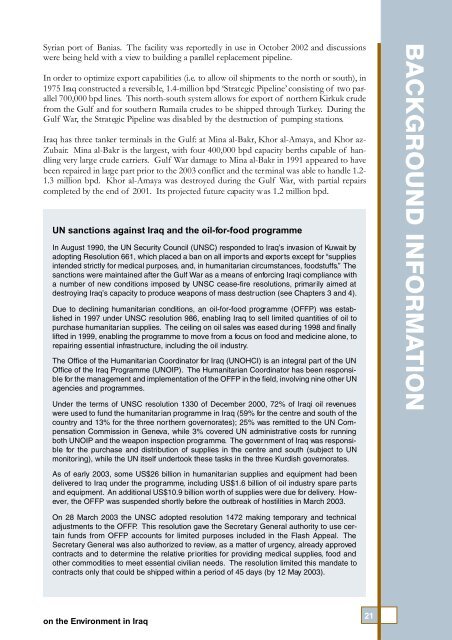Desk Study on the Environment in Iraq Desk Study on the ... - UNEP
Desk Study on the Environment in Iraq Desk Study on the ... - UNEP
Desk Study on the Environment in Iraq Desk Study on the ... - UNEP
You also want an ePaper? Increase the reach of your titles
YUMPU automatically turns print PDFs into web optimized ePapers that Google loves.
Syrian port of Banias. The facility was reportedly <strong>in</strong> use <strong>in</strong> October 2002 and discussi<strong>on</strong>s<br />
were be<strong>in</strong>g held with a view to build<strong>in</strong>g a parallel replacement pipel<strong>in</strong>e.<br />
In order to optimize export capabilities (i.e. to allow oil shipments to <strong>the</strong> north or south), <strong>in</strong><br />
1975 <strong>Iraq</strong> c<strong>on</strong>structed a reversible, 1.4-milli<strong>on</strong> bpd ‘Strategic Pipel<strong>in</strong>e’ c<strong>on</strong>sist<strong>in</strong>g of two parallel<br />
700,000 bpd l<strong>in</strong>es. This north-south system allows for export of nor<strong>the</strong>rn Kirkuk crude<br />
from <strong>the</strong> Gulf and for sou<strong>the</strong>rn Rumaila crudes to be shipped through Turkey. Dur<strong>in</strong>g <strong>the</strong><br />
Gulf War, <strong>the</strong> Strategic Pipel<strong>in</strong>e was disabled by <strong>the</strong> destructi<strong>on</strong> of pump<strong>in</strong>g stati<strong>on</strong>s.<br />
<strong>Iraq</strong> has three tanker term<strong>in</strong>als <strong>in</strong> <strong>the</strong> Gulf: at M<strong>in</strong>a al-Bakr, Khor al-Amaya, and Khor az-<br />
Zubair. M<strong>in</strong>a al-Bakr is <strong>the</strong> largest, with four 400,000 bpd capacity berths capable of handl<strong>in</strong>g<br />
very large crude carriers. Gulf War damage to M<strong>in</strong>a al-Bakr <strong>in</strong> 1991 appeared to have<br />
been repaired <strong>in</strong> large part prior to <strong>the</strong> 2003 c<strong>on</strong>flict and <strong>the</strong> term<strong>in</strong>al was able to handle 1.2-<br />
1.3 milli<strong>on</strong> bpd. Khor al-Amaya was destroyed dur<strong>in</strong>g <strong>the</strong> Gulf War, with partial repairs<br />
completed by <strong>the</strong> end of 2001. Its projected future capacity was 1.2 milli<strong>on</strong> bpd.<br />
UN sancti<strong>on</strong>s aga<strong>in</strong>st <strong>Iraq</strong> and <strong>the</strong> oil-for-food programme<br />
In August 1990, <strong>the</strong> UN Security Council (UNSC) resp<strong>on</strong>ded to <strong>Iraq</strong>’s <strong>in</strong>vasi<strong>on</strong> of Kuwait by<br />
adopt<strong>in</strong>g Resoluti<strong>on</strong> 661, which placed a ban <strong>on</strong> all imports and exports except for “supplies<br />
<strong>in</strong>tended strictly for medical purposes, and, <strong>in</strong> humanitarian circumstances, foodstuffs.” The<br />
sancti<strong>on</strong>s were ma<strong>in</strong>ta<strong>in</strong>ed after <strong>the</strong> Gulf War as a means of enforc<strong>in</strong>g <strong>Iraq</strong>i compliance with<br />
a number of new c<strong>on</strong>diti<strong>on</strong>s imposed by UNSC cease-fire resoluti<strong>on</strong>s, primarily aimed at<br />
destroy<strong>in</strong>g <strong>Iraq</strong>’s capacity to produce weap<strong>on</strong>s of mass destructi<strong>on</strong> (see Chapters 3 and 4).<br />
Due to decl<strong>in</strong><strong>in</strong>g humanitarian c<strong>on</strong>diti<strong>on</strong>s, an oil-for-food programme (OFFP) was established<br />
<strong>in</strong> 1997 under UNSC resoluti<strong>on</strong> 986, enabl<strong>in</strong>g <strong>Iraq</strong> to sell limited quantities of oil to<br />
purchase humanitarian supplies. The ceil<strong>in</strong>g <strong>on</strong> oil sales was eased dur<strong>in</strong>g 1998 and f<strong>in</strong>ally<br />
lifted <strong>in</strong> 1999, enabl<strong>in</strong>g <strong>the</strong> programme to move from a focus <strong>on</strong> food and medic<strong>in</strong>e al<strong>on</strong>e, to<br />
repair<strong>in</strong>g essential <strong>in</strong>frastructure, <strong>in</strong>clud<strong>in</strong>g <strong>the</strong> oil <strong>in</strong>dustry.<br />
The Office of <strong>the</strong> Humanitarian Coord<strong>in</strong>ator for <strong>Iraq</strong> (UNOHCI) is an <strong>in</strong>tegral part of <strong>the</strong> UN<br />
Office of <strong>the</strong> <strong>Iraq</strong> Programme (UNOIP). The Humanitarian Coord<strong>in</strong>ator has been resp<strong>on</strong>sible<br />
for <strong>the</strong> management and implementati<strong>on</strong> of <strong>the</strong> OFFP <strong>in</strong> <strong>the</strong> field, <strong>in</strong>volv<strong>in</strong>g n<strong>in</strong>e o<strong>the</strong>r UN<br />
agencies and programmes.<br />
Under <strong>the</strong> terms of UNSC resoluti<strong>on</strong> 1330 of December 2000, 72% of <strong>Iraq</strong>i oil revenues<br />
were used to fund <strong>the</strong> humanitarian programme <strong>in</strong> <strong>Iraq</strong> (59% for <strong>the</strong> centre and south of <strong>the</strong><br />
country and 13% for <strong>the</strong> three nor<strong>the</strong>rn governorates); 25% was remitted to <strong>the</strong> UN Compensati<strong>on</strong><br />
Commissi<strong>on</strong> <strong>in</strong> Geneva, while 3% covered UN adm<strong>in</strong>istrative costs for runn<strong>in</strong>g<br />
both UNOIP and <strong>the</strong> weap<strong>on</strong> <strong>in</strong>specti<strong>on</strong> programme. The government of <strong>Iraq</strong> was resp<strong>on</strong>sible<br />
for <strong>the</strong> purchase and distributi<strong>on</strong> of supplies <strong>in</strong> <strong>the</strong> centre and south (subject to UN<br />
m<strong>on</strong>itor<strong>in</strong>g), while <strong>the</strong> UN itself undertook <strong>the</strong>se tasks <strong>in</strong> <strong>the</strong> three Kurdish governorates.<br />
BACKGROUND INFORMATION<br />
As of early 2003, some US$26 billi<strong>on</strong> <strong>in</strong> humanitarian supplies and equipment had been<br />
delivered to <strong>Iraq</strong> under <strong>the</strong> programme, <strong>in</strong>clud<strong>in</strong>g US$1.6 billi<strong>on</strong> of oil <strong>in</strong>dustry spare parts<br />
and equipment. An additi<strong>on</strong>al US$10.9 billi<strong>on</strong> worth of supplies were due for delivery. However,<br />
<strong>the</strong> OFFP was suspended shortly before <strong>the</strong> outbreak of hostilities <strong>in</strong> March 2003.<br />
On 28 March 2003 <strong>the</strong> UNSC adopted resoluti<strong>on</strong> 1472 mak<strong>in</strong>g temporary and technical<br />
adjustments to <strong>the</strong> OFFP. This resoluti<strong>on</strong> gave <strong>the</strong> Secretary General authority to use certa<strong>in</strong><br />
funds from OFFP accounts for limited purposes <strong>in</strong>cluded <strong>in</strong> <strong>the</strong> Flash Appeal. The<br />
Secretary General was also authorized to review, as a matter of urgency, already approved<br />
c<strong>on</strong>tracts and to determ<strong>in</strong>e <strong>the</strong> relative priorities for provid<strong>in</strong>g medical supplies, food and<br />
o<strong>the</strong>r commodities to meet essential civilian needs. The resoluti<strong>on</strong> limited this mandate to<br />
c<strong>on</strong>tracts <strong>on</strong>ly that could be shipped with<strong>in</strong> a period of 45 days (by 12 May 2003).<br />
<strong>on</strong> <strong>the</strong> Envir<strong>on</strong>ment <strong>in</strong> <strong>Iraq</strong><br />
21

















